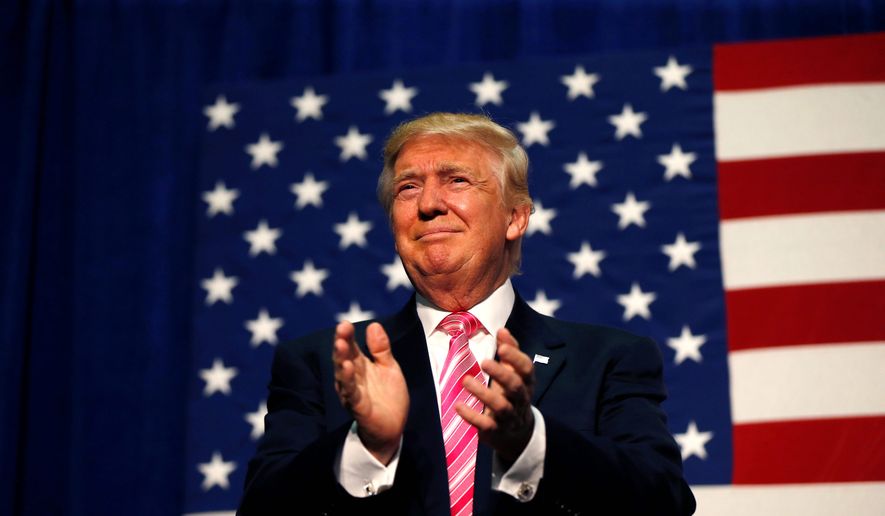Donald Trump’s new aggressive wooing of black voters is the type of messaging Republican Party insiders have clamored for from their presidential nominee, but the pitch was met with skepticism and scorn.
Republican campaign veterans said it was too little, too late to repair the New York billionaire’s reputation for racially insensitive and divisive rhetoric, which has helped push minority voters to Democratic nominee Hillary Clinton.
Experts on racial politics warned that Mr. Trump still sends mixed messages, such as touting inclusivity while simultaneously promoting a law-and-order agenda that many black voters interpret as code for police oppression in their neighborhoods.
The reactions suggested that it was not wroth trying to improve his standing with black voters, whose support for Mr. Trump registers in polls in the low single digits, with one recent national survey finding zero support.
Republican strategist Ron Bonjean, however, gave Mr. Trump credit for making a pitch that other GOP candidates wouldn’t dare. He said the effort also could pay dividends for Mr. Trump outside the black community.
“The Trump campaign can literally only go up in the polls with black voters at this point,” he said. “The strategy looks like it means to woo black voters, but it is also meant to persuade white Republican voters who have been turned off by Trump.”
SEE ALSO: Donald Trump battles to retake Virginia, once-reliably red state gone blue
Indeed, Mr. Trump also needs to build support among white voters in suburban communities to compete in battlegrounds such as Florida, Ohio and Pennsylvania, all places where he is trailing in most polls.
GOP strategist Gianno Caldwell cautioned against counting out Mr. Trump with minority voters. He said the invitation opened the door for usually loyal Democratic voters who are dissatisfied or don’t trust Mrs. Clinton.
“I’m very happy as a Republican, especially a black Republican, to see the kind of outreach Mr. Trump is doing,” he said on Fox News. “A lot of people don’t want to vote for Hillary Clinton and they need an alternative. Donald Trump is presenting that alternative by going after the black vote.”
Mr. Trump in recent days repeatedly pleaded with minority voters to give him a chance, pointing to substandard conditions and lack of opportunity in innercity neighborhoods after generations of Democratic leadership.
“You’re living in poverty, your schools are no good, you have no jobs, 58 percent of your youth is unemployed. What the hell do you have to lose?” Mr. Trump asked, as he deviated from his scripted stump speech in Dimondale, Michigan.
His depiction of black Americans and struggling in blighted urban neighborhoods provoked howls from his opponents, who heard racist overtones in the remark.
SEE ALSO: Mike Pence: Paul Manafort ‘didn’t want to be a distraction’
Mr. Trump stuck to the script the next day in Fredericksburg, Virginia.
“The GOP is the party of Lincoln, and I want our party to be the home of the African-American vote once again. I want an inclusive country, and I want an inclusive party,” he said.
He turned the tables on Mrs. Clinton, who has labeled him a racist and bigot.
“We reject the bigotry of Hillary Clinton who sees people of color only as votes, not as human beings worthy of a better future,” said Mr. Trump.
Republican Party officials applauded Mr. Trump’s new outreach, noting that his support from black voters is not much lower than what was garnered by the last two Republican presidential nominees.
Mitt Romney got 5 percent in 2012 and John McCain received 4 percent in 2008.
GOP strategist Ryan Williams, who worked on Mr. Romeny’s 2012 campaign, doubted Mr. Trump’s outreach would produce results because his reputation for being racially divisive had cemented.
He pointed to Mr. Trump’s hesitation earlier in the campaign to disavow support from former white supremacist David Duke, saying minority voters wouldn’t easily forget that.
“The problem is we are less than 100 days from the election and he is just now beginning to reach out to other constituencies,” he said. “His chances are slim to none at this point in terms of being able to change the perceptions of him with so little time to go before the election.”
Mr. Trump also continues to repel black voters, said Emory University political science professor Andra Gillespie, a fellow specializing in racial politics at the Joint Center for Political and Economic Studies in Washington.
“I think the problem with the appeal has a lot to do with the person who is actually making the appeal,” she said.
Ms. Gillespie said Mr. Trump’s appeals for support are drowned out by his call for law and order, which has long been a racial dog whistle in politics.
“He can’t do both of them in the same breath and then expect that’s actually going to win you support among African-Americans,” she said. “You can’t reach out on one hand and then make inflammatory comments on the other hand.”
• S.A. Miller can be reached at smiller@washingtontimes.com.




Please read our comment policy before commenting.